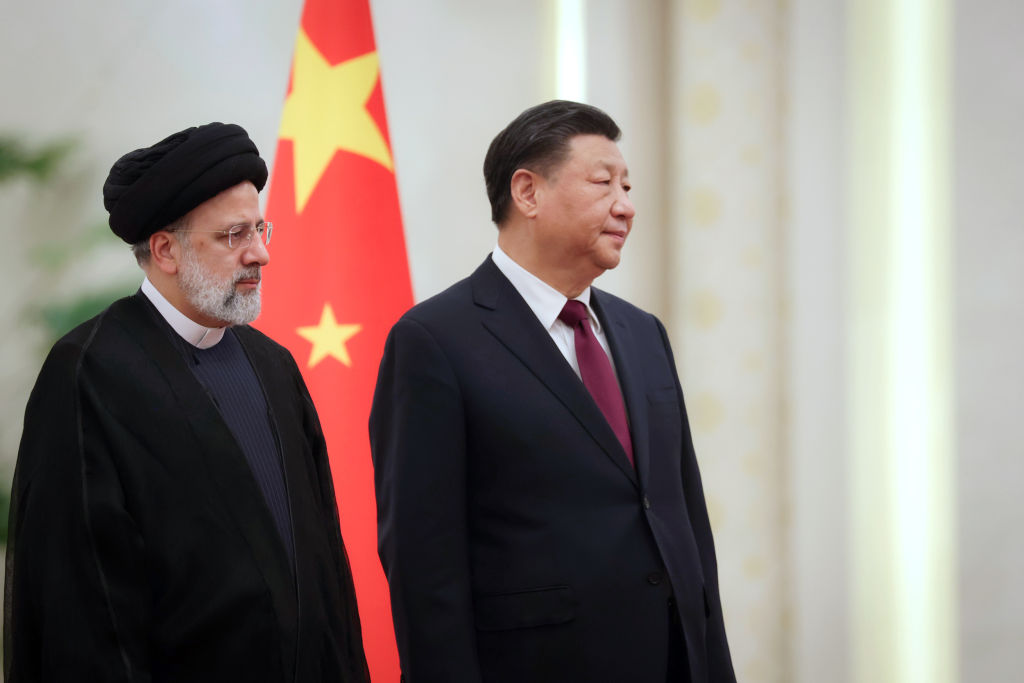
Iran’s President Ebrahim Raisi met China’s leader Xi Jinping Tuesday as part of a three-day visit to help implement a 25-year cooperation alliance between the two nations, at a time when both countries are facing pressure from Western countries over a range of issues.
The high profile visit—made at the invitation of Xi—is Raisi’s first state visit to the East Asian nation, and the first of any Iranian President in 20 years.
The two leaders have only met once before in September at the Shanghai Cooperation Organisation (SCO) summit in Uzbekistan. In 2021, the year Raisi took office, the two countries signed a 25-year “strategic cooperation pact,” and they signed a number of bilateral cooperation documents Tuesday, according to Chinese state media.
Raisi arrived alongside the new central bank governor, as well as six members of his cabinet including ministers who focus on the economy, petroleum, foreign affairs, trade, transport and urban development, and agriculture.
Iran has faced sanctions over its nuclear program and criticism for providing drones to Russia. Meanwhile, U.S.-China ties deteriorated earlier this month after Washington spotted an alleged Chinese spy balloon within U.S. airspace and later shot it down.
Below, what to know about the growing relationship between Iran and China.
What does Ebrahim Raisi’s rare state visit represent?
“We are in the middle of a momentous reordering of world politics. As such, new alliance patterns are emerging and strengthening,” says Arshin Adib-Moghaddam, a professor of politics and international studies at London’s School of Oriental and African Studies (SOAS) and author of What is Iran?
“The Iran-China link must be seen as a part of this new constellation,” adds Adib-Moghaddam.
More from TIME
Read More: Why a New Iranian Nuclear Deal Still Seems Unlikely
Both countries have faced scrutiny over their stance on Russia’s invasion of Ukraine almost a year ago. Russia and China are both members of the Shanghai Cooperation Organisation, a Eurasian political, economic, and security organization. The body, which formed in 2001 as the Shanghai Five, brought together Russia, China, and ex-Soviet states in Central Asia. It expanded in 2017 to include India and Pakistan. In September last year, Iran signed a memorandum to join the organization. The group aims to operate as a counterweight to Western influence and is the world’s largest regional organization.
What agreements will likely be reached between Iran and China?
Implementing the 25-year “strategic cooperation pact” is expected to feature prominently. The pact is aimed at seeing China invest billions of dollars in Iran’s oil and gas sectors, in exchange for supplies.
China is already Iran’s largest trading partner but invested just $162 million in the first year of Raisi’s presidency. Still, China remains Iran’s largest trading partner. According to data recorded by Iranian customs for the first 10 months of the current Iranian calendar year—which ends in March—Tehran’s exports to Beijing are worth $12.6 billion, while it imported $12.7 billion worth of goods from China.
Additionally, regional issues such as Russia’s war in Ukraine and the 2015 Iran nuclear deal with world powers, of which China is a signatory, are expected to be discussed. The nuclear talks remain deadlocked but Iran’s chief nuclear negotiator, Ali Bagheri Kani, is among the Iranian delegation visiting China. The sanctions are a major impediment to developing new contracts and projects as part of the 25-year cooperation pact.
Also on the agenda is Iran’s relations with Arab governments. At the end of last year, Tehran summoned China’s ambassador in Iran after Beijing joined the Gulf Cooperation Council in issuing a statement that questioned Iran’s territorial claims in the Strait of Hormuz. Tehran expressed “strong dissatisfaction” during the visit. While some may expect the issue to be discussed in Beijing, Arshin Adib-Moghaddam thinks it will be strategically avoided.
He said that the nations will likely “keep the GCC factor out of their bilateral relationship, as they are aware that their interests do not have to align on every geopolitical theater.”
More Must-Reads from TIME
- Cybersecurity Experts Are Sounding the Alarm on DOGE
- Meet the 2025 Women of the Year
- The Harsh Truth About Disability Inclusion
- Why Do More Young Adults Have Cancer?
- Colman Domingo Leads With Radical Love
- How to Get Better at Doing Things Alone
- Michelle Zauner Stares Down the Darkness
Write to Armani Syed at armani.syed@time.com